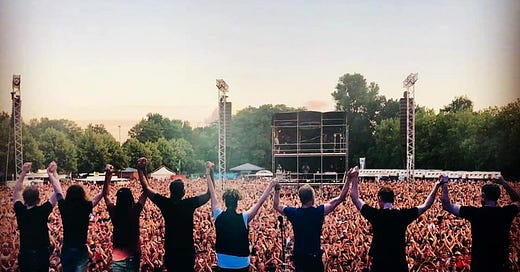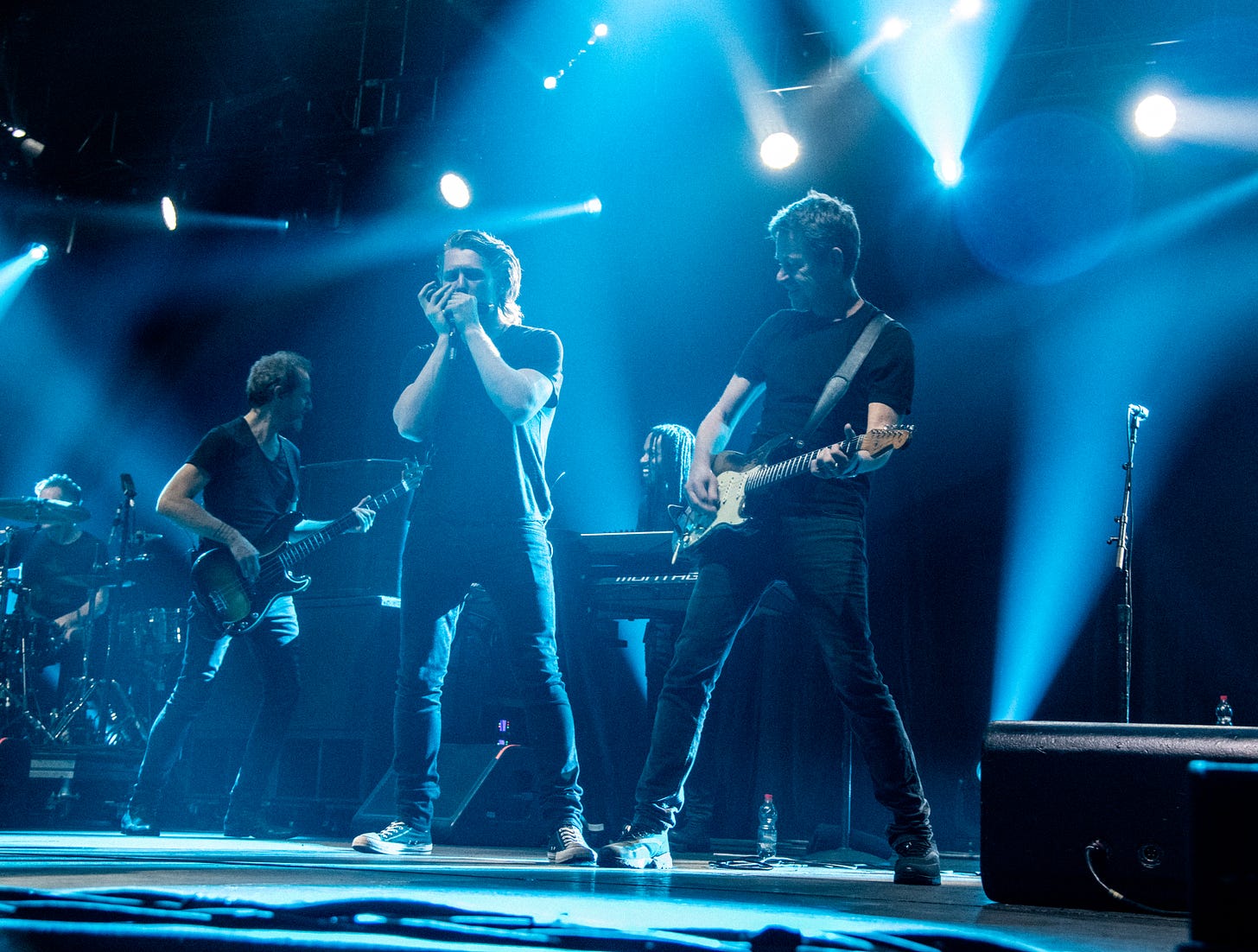There’s a switch we flip. It’s subtle and necessary. It could be closing your eyes. It could be a grin at a cute girl in the audience. It could be taking two shots of good booze off stage before the first chord resonates. We all strive for the disconnection that happens in a moment of total and utter presence on stage. Disconnecting from the inner critics, the goblins and trolls that scream in our heads to turn up or down, to give stink eyes to the drummer, to curse our gear, and all we have practiced.
The thinking brain is no friend to the improviser. The greatest realization of the stage is the joy of turning off your analysis, if only for ninety minutes.
You are not thinking, you just are.
I was speaking to my good friend Louis the other night at a gig in Cambridge. We discussed the line between analytical practice and how it transfers to the loose, carefree feeling of being totally in the moment on stage. How does that work? Why spend so much time being so picky and anal about what and how we practice only to have beautiful moments of disconnect on stage?
Where is the line between solid technique and a “fuck it” mentality?
I have some thoughts.
The stage is a chance for deeper awareness. Those elevated pieces of plywood provide a rare discomfort, no matter how big or small the crowd. It's a form of meditation. It’s not sitting under the Bodhi Tree or hiding out in some faraway cold cave that makes me feel present: it’s the sound of feedback, cranked amps, and crashing cymbals. It’s those moments of quiet respite between songs where you search desperately for the next song on the setlist and wet your whistle with a fresh beer. I often compare the process of a gig to that of a mindfulness practice: we believe them all to be the same, yet when you look under the hood, when you see the tree itself instead of the forest, you realize how special each moment up there can be.
You realize that what seems ordinary to you may be extraordinary to anyone else.
A gig is never just a gig: it's a gift.
During the COVID Pandemic, live music was shut down. Like many of you, I went into my woodshed with the sole intent of becoming the best harmonica player I could be. Hours every day spent playing scales, studying changes and arpeggios, learning solos, etc. I became more technically proficient during that time, 100%, how could you not? But want to know the craziest thing? When I started playing gigs again, it didn’t translate. All that work I had put in was frozen in time because I was dealing with a new and strangely familiar stimulus: a live audience.
This is where we cross paths with the analytical brain. Due to the addition of a live audience, we feel this subconscious pressure to “play something good.” We concoct a false image of ourselves as demigods, playing to our patrons and wishing only to shower them with our technical brilliance. We believe that because we have spent the requisite time in our woodshed, we are guaranteed a better solo, a bigger applause, more girls.
The truth?
No one wants to hear how technically brilliant you are: they want to feel something.
I always tell my harmonica students, "You play the instrument, don’t let the instrument play you”. As harmonica players, we can find ourselves very quickly in technical ruts. We play a blues lick we have memorized repeatedly, only to drive ourselves and everyone we live with crazy. This becomes muscle memory, and without command of your axe, you won't be able to convey an emotional idea in your improvisation. We find ourselves playing our instruments on autopilot, and without the risk and reward of exploring new ways to make sound, we silence our ability to grow. The harmonica plays us.
We communicate emotion through sound, not through dizzyingly fast licks. We channel feeling through space, not through endless streams of arpeggios. We generate growth as musicians when we realize the most fundamental things are the most fundamental.
As Albert Einstein said:
“Not everything that can be counted counts, and not everything that counts can be counted.”
Feeling can’t be counted. It can’t be synthesized. This is why you must build up a reservoir of deep technique to generate musical ideas. The more technical you become, the more you understand how to communicate feelings.
Here’s an example: If I told you right now to make someone feel scared, you would know how to do that; you’d hide behind a wall and jump out, yell loudly, etc. But you’ve only learned how to do that because you have spent the requisite time learning how to communicate that emotion. The same applies to music. Every sound we make is an adjective, and like a writer building up his or her vocabulary, technique becomes a glossary of emotional choices.
Technique will only get you so far. I preach endlessly on this Substack about the importance of careful practice and planning things out. But the truth is that, in the real flesh and blood world away from those hours of bloody, calloused fingers and sore lips, is a realm that negates much of that mental processing you’ve tried so hard to engrain. Playing live is a merciless exercise in public speaking and a showcase of heart, not brains.
We supply ourselves with more tools when we study techniques and scales, but they only get us to a place, a special place: a place I call “The Fuck It Mentality”
I said in a previous article that “every gig is an act of faith.” It is. We have no control over what will happen or how the audience will respond to us.
But here’s what we do have control over: letting go.
Here are some strategies and mentalities I like to have when getting on stage:
Think of the bandstand as the best party in town. It’s not a clinic. It’s not a lab. It’s a fucking bar. You have this rare opportunity to have fun with other people who are as passionate about music as you are. Don’t spend the time thinking “oh man, I fucked up that song”; think of yourself as the ultimate cheerleader. You are throwing the biggest party, and your job is to make the audience jealous of how much fun you're having.
When you take a solo, play a short phrase to begin and take a look at the crowd. How’d they react to what you just played? I’ll tell you: most of them were too busy sipping their beer and catching up with their friends about the latest White Lotus episode. I won’t sugar coat it: no one cares what you play, but they care about how you play it. Always be cognizant of the energy of the crowd.
That inner editor of yours? Give him or her a break. Tell yourself before you go on stage that you only have one goal tonight: to have fun. That’s it. It doesn’t have to be that serious. All the “serious” work can happen in the woodshed, a practice room, whatever. But the stage isn’t serious, it's sublime. Use your common sense, put a smile on your face, and be open to the idea that you have a world of knowledge to gain from any gig, the good and the bad.
Excitement is a powerful tool. The Fuck It Mentality is built on excitment. The most crucial emotion you bring to the bandstand is excitement. There’s so much to be excited about if you are in the moment.
Don’t kid yourself. You only earn a “Fuck It” Mentality by radical acceptance of reality. It’s not an easy thing to put into practice. But think of it this way: you spend all this time practicing, perfecting, and beating yourself up to operate in a world and on a stage where nothing will ever be perfect.
There’s no such thing as a perfect gig, but there is such a thing as an imperfect discovery. Each gig is a discovery, a lesson, a time to toss caution to the wind and have fun with your friends.
Music, that long and winding road, is a marriage of the stern analytical parents who tell their kids to eat their broccoli, and the rebellious, emotional, wild, and free youths who know that the only way to exist in this world is with a sense of wonder.
Fuck it. Life is too short to beat yourself up. Grab your guitar, your sax, your harmonicas. Make some mistakes and make them again.
Do your due diligence, but don’t feel doomed to diligence.
Have a good week :)
-Shane







Wow. Another great article Shane
I definitely confer with these wise words of wisdom. Although the inner critic when performing live does still rear his gnarly head at times, I have learned to not believe him.
There are certain negative type of mental patterns, whether it's regarding our musical performance or something entirely else, that we may never be completely rid of. But we can definitely learn to smile at the critic, and say something like thanks but no thanks, or simply cultivate an inner smile that is founded in knowing that this in our head doesn't get to define the day. Doesn't get to rob us of why we are on stage in the first place, the joy of performing and with beloved bandmates.
Perhaps a tad ironically, this reminds me of another type of negative voice that can arise in me regarding other players.
In short, the other gigging harmonica players around here are lazy - they don't truly care about their bends, and they don't push themselves to learn and grow when not on stage. They are in default mode, and I have let that really bother me because I feel like it does our instrument a disservice.
But you are right, the majority of audiences don't care what you play, they care how you play it.
This one guy around here in particular is always impressing people, but he doesn't even know how to play in the chord, from one moment to another, just sucking and blowing with a big sound because he's a big guy with a huge jaw. He has no knowledge of how to play even a simple blues progression, he just does the same riffs, especially relying on and over using the four draw bend, the easiest bend of them all. Pretty much only serious harmonica players and real blues musicians would even notice, or care…
But this is another type of negative voice I am learning to let go of, to not give a fuck about, because it doesn't matter, and it has nothing to do with me.
And to cap off what I was saying and relating to about that inner critic attempting to ruin the party, another way of putting it is this:
I've learned that even when I know I've done a passage or bend that didn't come out as I heard and felt it in the moment, the way I meant it in the moment, to take a deep breath and bring all my love and attention into the next note, the next phrase, the next bend.
Greatly appreciate your writings, and of course your wonderful playing.